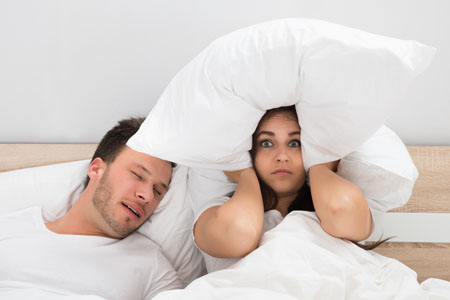 As a sleep apnea dentist office, we treat patients that are having difficulty breathing while sleeping. Obstructive sleep apnea is a fairly common condition that can make people feel overly fatigued and tired regardless of how much actual sleep they get. This problem can lead to unintended car accidents, workplace injuries, and a deteriorating social life, as those who suffer is unable to stay awake past dinner. If this sounds like you, or if you wake up in the night due to your loud snoring or choking – you could have sleep apnea.
As a sleep apnea dentist office, we treat patients that are having difficulty breathing while sleeping. Obstructive sleep apnea is a fairly common condition that can make people feel overly fatigued and tired regardless of how much actual sleep they get. This problem can lead to unintended car accidents, workplace injuries, and a deteriorating social life, as those who suffer is unable to stay awake past dinner. If this sounds like you, or if you wake up in the night due to your loud snoring or choking – you could have sleep apnea.
What is sleep apnea?
We encourage people to visit our San Juan Capistrano dental office so that we can examine their teeth and discuss any possible symptoms we notice. We may also recommend that the patient takes an at-home sleep study so that we can obtain a report of what happens with the breathing during sleep. This will let us know whether or not the patient has sleep apnea so that we can create a plan for treatment.
Obstructive sleep apnea generally occurs when the lower jaw falls backward, and the tongue falls with it. The tongue blocks the airway, making it hard to breathe at night. The body responds by choking, snoring, and gasping for breath. As a sleep apnea dentist, we have a non-invasive way to treat the condition. We can make an impression of the patient’s mouth and take measurements. We will send the results to the dental lab to create a removable oral appliance for the patient. The oral appliance is a device that slips into the mouth during sleep and holds the jaw forward.
While simple, the oral appliance is an effective solution that can help to get the necessary oxygen in order to feel healthy. The device is comfortable, makes no noise, and is as small as a retainer. Patients can easily and discreetly take it with them when they are traveling instead of taking the loud and bulky CPAP machine. We are confident that if a patient tries this solution, he or she will greatly enjoy the convenience of wearing an oral appliance.
Why should I visit a sleep apnea dentist before cold and flu season?
The body needs sleep in order to rejuvenate and for the immune system to function properly. With an impaired immune system, the patient is more likely to come down with a cold or flu, while also being more susceptible to catch a myriad of other viruses and infections. Not only is a patient more likely to get a cold or infection, but the body will have less capability to fight the infection, meaning the individual can be sick for a longer period of time.
What adds to this is that the body will fight infections with a fever, and fevers rise at night. This is important for healing. However, if you are not sleeping well at night, you are further restricting the body’s ability to heal itself.
Call our dental office at (949) 245-0577 for more information.
Related Posts
General Dentistry Restoration Options to Repair a Damaged Tooth
General dentistry consists of a lot of routine oral health care, which also happens to include restoring teeth that are in bad shape due to damage. Common damage may include cracks, chips, …
General Dentistry: Why Do I Need X-Rays?
X-rays in general dentistry are useful for catching dental conditions that may not be visible to the eye. General dentists typically require patients to get x-rays at least once a year to ensure that the …
Maintaining Dental Check-Up Appointments After Periodontal Disease Treatment
Following the treatment of periodontal disease, it is vital that a patient keeps the Dental Checkup appointments that the dentist recommends. Periodontal maintenance, which typically requires dental check-ups every three months post-treatment, is essential for …
Gum Therapy - What Happens in a Deep Teeth Cleaning?
A deep teeth cleaning is not just a procedure needed after skipping dental visits. Instead, a deep teeth cleaning is designed to help combat periodontal disease and gum recession, both of which …

